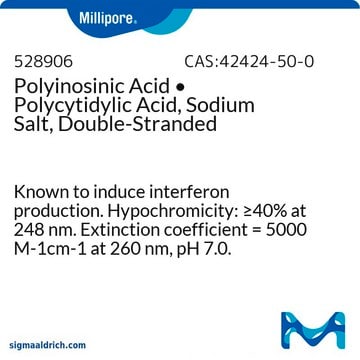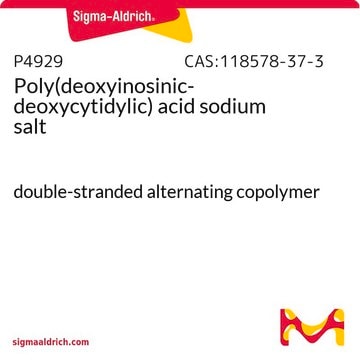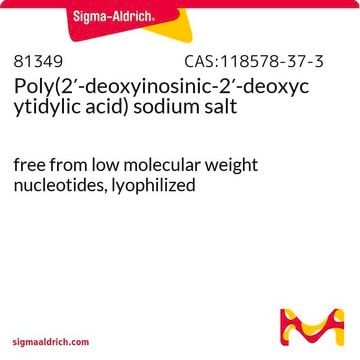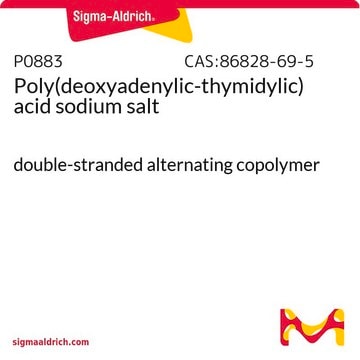I3036
Polyinosinic–polycytidylic acid potassium salt
γ-irradiated
Sinónimos:
Poly (I:C), Poly(I) • Poly(C)
Iniciar sesiónpara Ver la Fijación de precios por contrato y de la organización
About This Item
Productos recomendados
assay
≥99% (TLC)
composition
, 8-12% UV
storage temp.
−20°C
¿Está buscando productos similares? Visita Guía de comparación de productos
Biochem/physiol Actions
Transfection of Poly (I:C) into NIT-1 cells has been used as a model of intracellular dsRNA-induced β cell apoptosis. Eighteen hours post transfection, 45% of the cells were apoptotic with an increase in NF-kB, p50/p65 nuclear translocation, and cleavage of caspases 3 and 8, as well as transcriptional induction of caspase 12, Fas, IL-15, and the TNF receptor-associated ligand (TRAIL). It has been suggested that Poly(I:C) is one of the most appropriate generators of stable mature dendritic cells (DC). These mature DC might generate in vivo effective immune responses after injection due to their ability to secrete bioactive IL-12 after CD40 ligation. Poly (I:C) was used as a potent adjuvant to enhance the specific anti-tumor immune responses against a peptide-based vaccine.
Packaging
Package size based on polynucleotide content
Other Notes
Double-stranded homopolymer.
Physical form
10% Poly (I:C) with sodium chloride and sodium phosphate buffer salts
Storage Class
11 - Combustible Solids
wgk_germany
WGK 3
flash_point_f
Not applicable
flash_point_c
Not applicable
Certificados de análisis (COA)
Busque Certificados de análisis (COA) introduciendo el número de lote del producto. Los números de lote se encuentran en la etiqueta del producto después de las palabras «Lot» o «Batch»
¿Ya tiene este producto?
Encuentre la documentación para los productos que ha comprado recientemente en la Biblioteca de documentos.
Los clientes también vieron
Lingjun Meng et al.
Proceedings of the National Academy of Sciences of the United States of America, 112(35), 11007-11012 (2015-08-19)
Systematic inflammation contributes to the development of many diseases, including cardiovascular disease, which is the leading cause of mortality worldwide. How such inflammation is initiated and maintained throughout the course of disease remains unclear. In the current study, we report
Nuestro equipo de científicos tiene experiencia en todas las áreas de investigación: Ciencias de la vida, Ciencia de los materiales, Síntesis química, Cromatografía, Analítica y muchas otras.
Póngase en contacto con el Servicio técnico














